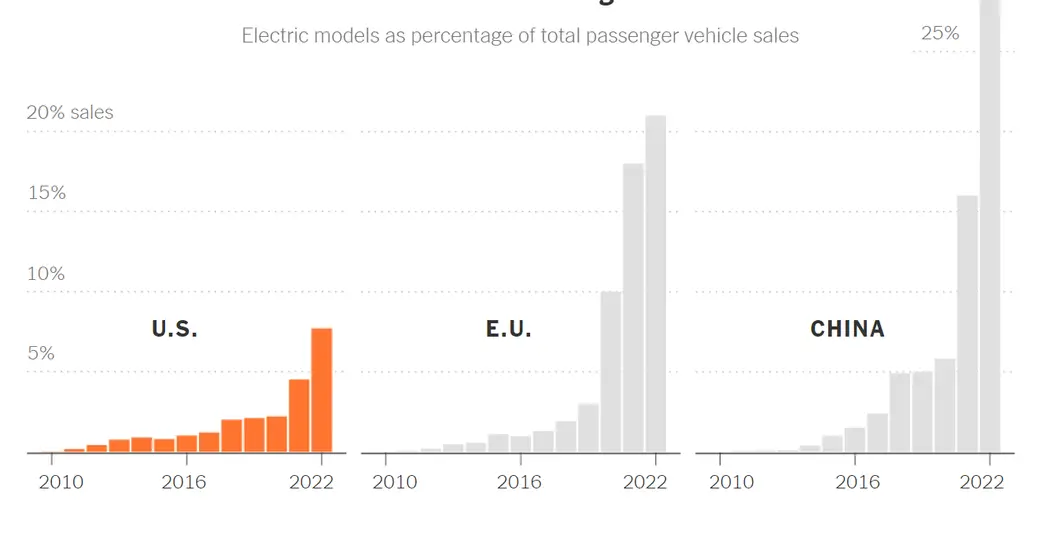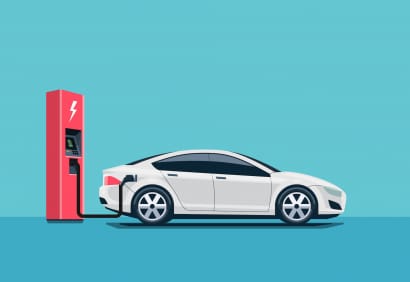Countries Experiencing Exponential Growth in Electric Vehicle Markets.
The global shift towards sustainable transportation is gaining momentum, and electric vehicles (EVs) are at the forefront of this transformative journey.


The global shift towards sustainable transportation is gaining momentum, and electric vehicles (EVs) are at the forefront of this transformative journey. Several countries are witnessing remarkable growth in their electric vehicle markets, driven by a combination of technological advancements, environmental consciousness, and proactive government policies. Let's explore some of the nations that are spearheading the charge toward a cleaner and greener automotive future.
- China: The Electric Giant
China stands out as a global leader in the electric vehicle market, experiencing unprecedented growth. The Chinese government has implemented aggressive policies to promote EV adoption, offering substantial subsidies, and incentives, and investing heavily in charging infrastructure. Home to the world's largest EV market, China continues to lead in both production and sales of electric vehicles.
- Norway: A Pioneering Nation
Norway has set itself apart as a trailblazer in promoting electric mobility. With a comprehensive package of incentives, including tax exemptions, toll-free roads, and extensive charging infrastructure, Norway has achieved one of the highest electric vehicle adoption rates globally. In 2021, electric vehicles accounted for over 50% of new car sales in the country, showcasing the success of its forward-thinking policies.
- The Netherlands: A Dutch Drive Toward Sustainability
The Netherlands has rapidly embraced electric vehicles, driven by a commitment to sustainability and a robust charging infrastructure. The Dutch government has implemented measures to phase out traditional combustion engine vehicles, setting ambitious targets for the adoption of electric vehicles. With an increasing number of charging stations and supportive policies, the Netherlands continues to witness substantial growth in its electric vehicle market.
- Germany: Automotive Innovation Hub
Germany, a powerhouse in the automotive industry, is experiencing a surge in electric vehicle adoption. As home to major automakers like Volkswagen, BMW, and Mercedes-Benz, Germany has intensified its focus on electric mobility. The government's incentives, including purchase premiums and investment in charging infrastructure, have propelled the growth of the electric vehicle market, making it a crucial player in the global transition to sustainable transportation.
- United States: Accelerating the EV Revolution
In the United States, the electric vehicle market is gaining momentum, driven by a combination of federal and state-level incentives, advancements in technology, and a growing environmental awareness. States like California are at the forefront of EV adoption, with ambitious targets to phase out gas-powered vehicles. Major automakers are investing heavily in electric vehicle production, contributing to the overall growth of the market across the country.
- India: Emerging as an Electric Player
India is emerging as a significant player in the electric vehicle market, driven by a focus on reducing air pollution and dependence on fossil fuels. The Indian government has announced ambitious plans to promote electric mobility, offering incentives for manufacturers and consumers. With a rapidly growing urban population, India's electric vehicle market is poised for substantial expansion in the coming years.
In summary, as the global automotive landscape undergoes a revolutionary transformation, these countries are leading the way in fostering electric vehicle adoption. Through a combination of supportive policies, robust infrastructure, and a commitment to sustainability.

The growth in electric vehicles globally is driven by a combination of technological advancements, environmental consciousness, and government initiatives worldwide. As we delve into the factors propelling this momentum, it becomes evident that the electric vehicle market is not just evolving; it is accelerating into the future.
- Technological Advancements:
One of the primary catalysts for the electric vehicle market's rapid growth is the continuous evolution of technology. Breakthroughs in battery technology have significantly enhanced the range, efficiency, and affordability of electric vehicles. Lithium-ion batteries, which power most electric cars, have witnessed substantial improvements, leading to increased energy density and decreased production costs.
Moreover, ongoing research into alternative battery technologies, such as solid-state batteries, promises even more significant advancements shortly. These technological strides not only make electric vehicles more accessible to the general public but also address concerns related to charging infrastructure and range anxiety.
- Government Incentives and Policies:
Governments across the globe are actively promoting the adoption of electric vehicles through a variety of incentives and policies. Financial incentives, tax credits, and subsidies are often offered to both manufacturers and consumers, making electric vehicles more economically attractive. Additionally, stringent emission standards and environmental regulations are compelling automakers to shift toward electric models.
Countries like Norway, for example, have set ambitious targets to phase out traditional internal combustion engine vehicles entirely, emphasizing the pivotal role electric vehicles play in achieving sustainable transportation. Such governmental initiatives create a favorable environment for the electric vehicle market to thrive.
- Environmental Consciousness:
Increasing environmental awareness and concerns about climate change have prompted a growing number of consumers to choose electric vehicles as an eco-friendly alternative. Electric vehicles produce zero tailpipe emissions, contributing to cleaner air and a reduction in greenhouse gas emissions. The eco-conscious consumer is becoming a driving force behind the electric vehicle market's expansion, as individuals seek to align their transportation choices with sustainability goals.

- Expanding Charging Infrastructure:
An essential component of electric vehicle adoption is the availability of a robust charging infrastructure. Governments, private companies, and even traditional oil and gas companies are investing heavily in building charging stations. The expansion of fast-charging networks helps alleviate range anxiety and makes electric vehicles a more practical choice for everyday use.
- Market Competition and Innovation:
The competitive landscape within the electric vehicle market is fostering innovation and driving down costs. Established automotive manufacturers and tech companies alike are entering the EV arena, leading to a diverse range of models with varying features and price points. This competition is pushing the industry to innovate in design, performance, and affordability, further enticing consumers to make the switch to electric.
To conclude, the electric vehicle market is not merely on the rise; it is in the midst of a transformative revolution. With technology continuously advancing, supportive government policies, a growing environmentally conscious consumer base, an expanding charging infrastructure, and fierce market competition, the growth of the electric vehicle market shows no signs of slowing down. As we witness this rapid evolution, it is evident that electric vehicles are not just the future of transportation; they are the present, steering us toward a more sustainable and electrifying tomorrow.




